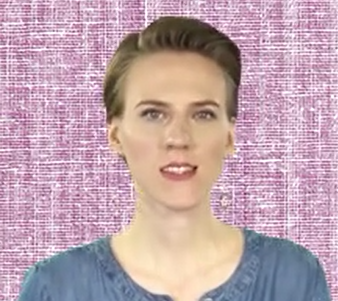This is Everyday Grammar. I'm Kaveh.
欢迎收看《每日语法》栏目,我是卡维。
And I'm Lucija. We have a great topic for you today.
我是露西佳,我们为今天的节目准备了一个大的话题。
Yes, Lucija has a lot of examples prepared on the subject of "HAVE, HAS, and HAD."
是的。露西佳为have/has/had这个主题准备了好多例句。
HAVE, HAS, and HAD contain different meanings.
have/has/had有不同的意思,
They can show possession: "I have a car."
可以表示拥有,例如:我有一辆车,
But HAVE, HAS, and HAD can also be used to form the perfect tenses. For example:
但是have/has/had也可以用来表示完成时态,例如:
I have seen the movie.
我看过这部电影。
In this example, "have" is just a grammar function word to show that the action is completed.
在这个例子中,have仅仅起到语法作用,表示动作已完成。
HAS is used with the present third person singular.
has与现在时第三人称单数一起使用;
With the personal pronouns she, he, and it, you would use HAS in most situations.
大多数情况下,当人称代词为she/he/it时,使用has,例如:

She has a bike.
她有一辆自行车。
It has blue ink.
里边是蓝色墨水。
Let's take a look at HAVE:
接下来,我们来看一看have的用法:
PRESENT PERFECT: I/You/We/They have seen the movie.
现在完成时:我/你/我们/他们看过这部电影。
POSSESSION (PRESENT): I/You/We/They have a cat.
表所有(一般现在时):我/你/我们/他们养了一只猫。
HAD is simple. It's used to show possession in the past for all pronouns and used to form the past perfect for all pronouns.
had很简单,它用来表示所有代词过去的所有物,且可以构成过去完成时修饰所有代词。
PAST PERFECT: I/You/We/They/She/He/It had already finished.
过去完成时:我/你/我们/他们/她/他/它已经完成了。
POSSESION (PAST): I/You/We/They/She/He/It had a baby.
表所有(一般过去时):我/你/我们/他们/她/他/它曾有个小孩。
Here's a tricky question for you, Lucija, what would you use with "everyone" or"everybody?"
露西佳,提一个棘手的问题,当代词是everyone/everybody时,你用哪个词?
Well, since "everyone" and "everybody" are both singular pronouns, I would use "has."
这个嘛!既然everyone和everybody都是单数代词,我会用has。
And that's Everyday Grammar.
以上就是今天节目的全部内容。











